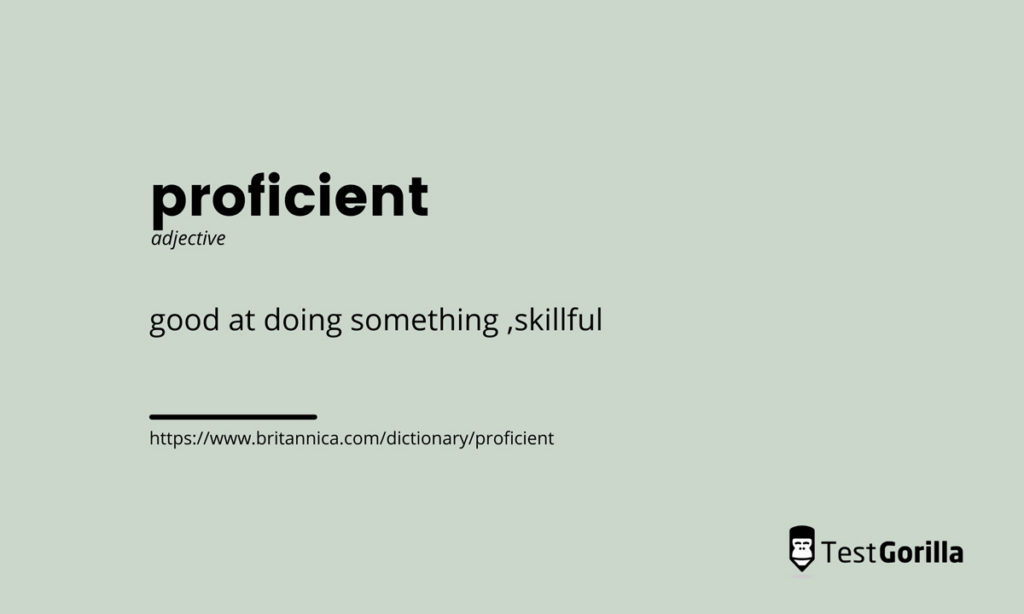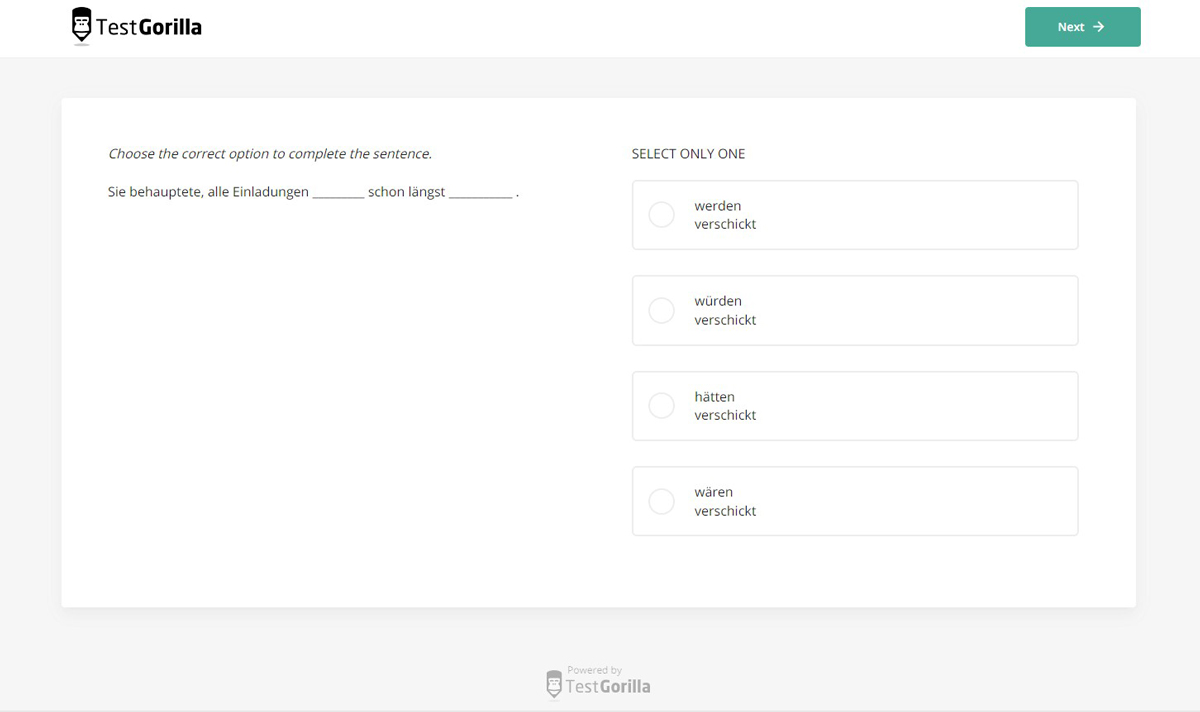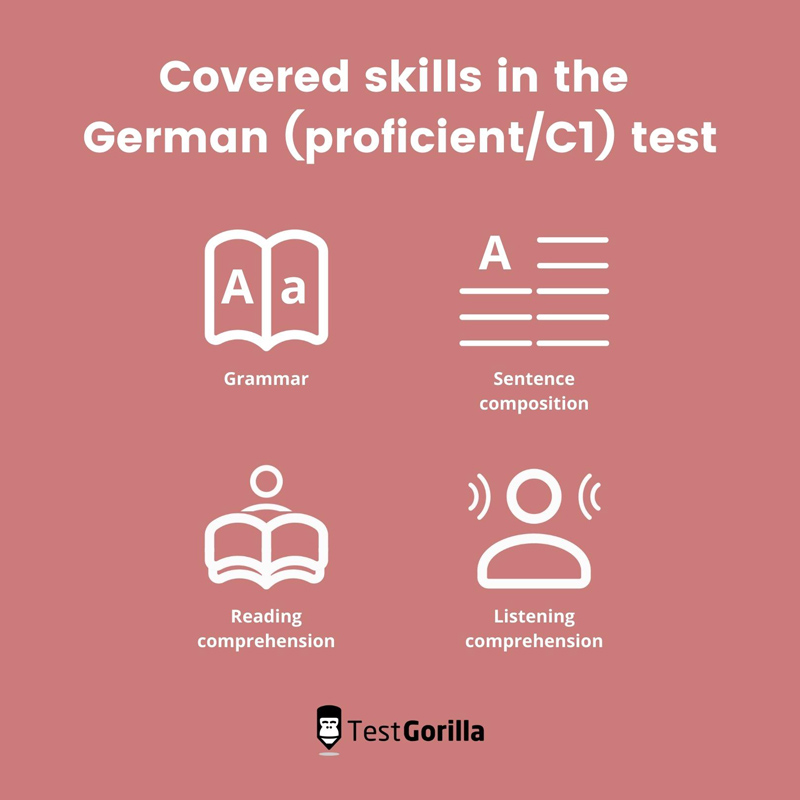There are around 155 million German speakers worldwide, and it is also considered to be one of the main business languages of the world , alongside English, Spanish, and Mandarin. There are also a large number of German-speaking people in other European countries, including Austria, Holland, Denmark, Belgium, Switzerland, Liechtenstein, and Luxembourg.
These statistics show that there is a big need for proficient German speakers, and it’s a valuable skill to learn as it opens up opportunities in the job market.
We’re going to look at what proficient/C1 means, along with roles that call for a proficient/C1 level of German, and how our C1 German test can quickly help you find competent German speakers.
We’ll also show you how you can build a pre-employment assessment around the C1 German test to enable you to make data-driven hiring decisions.
Table of contents
What does C1 level German mean?
There are different levels of ability to communicate in a specific language. Someone may only have a basic grasp of German, while others may be able to hold a fluent conversation or write a complicated text in the language.
In order to standardize and align language fluency levels, the Common European Framework of Reference (CEFR) for languages built a simple framework from A1 through to C2, with each level representing a growing mastery of the language.
At the C1 German CEFR level, a student can:
Understand a wide range of demanding, longer clauses, and also recognize implied meaning in German
Express thoughts and ideas fluently without much obvious thinking about it or searching for expressions
Use the German language effectively in social, academic, and professional settings
Produce clear, detailed, and well-structured German text on complex subjects
C1 level German is considered advanced and shows the holder has full control of German grammar and vocabulary. The only higher CEFR level is C2, which even native German speakers can struggle to reach.
Those with a German C1 level fluency can do just about any job role that requires a good German speaker, so there are many employment opportunities worldwide for them. In the next section, we’re going to look at a range of jobs that require German C1 level fluency.
5 roles for proficient/C1 German speakers
Although those with German C1 level language skills can do any job a native German speaker can do, here are some of the most popular roles:
1. Teacher/trainer
There are two ways people can use German C1 level skills for a teaching career. They can opt to stay in their home country and teach German, or live in a German-speaking country and teach English.
There are also opportunities in online teaching or private tutoring for German C1 level speakers. Teachers also need other abilities, including communication, empathy, problem-solving, and organizational skills.
2. Airline crew
Any job that requires being on board an airplane needs fluency in English, whether that be the pilots or cabin crew. Knowing English is not just useful for cabin crew, but is also the international language of aviation so flight crew must have a good understanding of it.
However, those who want to work for a German airline will also need to have good German-speaking skills. Having fluent German can be very useful for working with any European airline, as German is used a great deal as a business language there.
3. Writer/content creator
Many companies require guides, instructions, and documentation to be written in German. Those who do this job must be proficient in German, especially if it comes to writing instructions and documentation, where errors can be costly.
Many websites are also producing content in different languages, and require employees with C1 level German. Writers and other content creators also need to have strong attention to detail to spot and fix any errors.
4. Translator
This is one of the obvious roles for those with excellent German language skills. Those who do this job also need to be fluent in another language.
It depends on the job, but translators convert written material from German to another required language, and vice versa. Translators often have to talk to clients to clarify any unclear points, so good communication skills are also needed for this role. Other important abilities include writing skills and experience with Computer-assisted Translation (CAT) software.
5. Customer care/service
Customer care/service representative jobs are often considered entry-level, but there are management positions in this area too. Many organizations in German-speaking countries or with German customers require fluent C1 level German speakers to work in these roles.
The job includes interacting with customers, providing information about products and services, and to deal with customer complaints.
Excellent communication abilities and data entry skills are also essential for this role.
Top job sectors for German speakers
The demand for good German speakers is growing, and it’s particularly apparent within these job sectors:
Marketing
Germany’s influential economy means that many international companies are keen to access the German market. In order to do this successfully, these organizations require employees who are skilled in the German language.
Roles such as PR, email marketing, content marketing, and copywriting benefit from German speakers.
Sales
As with marketing, being proficient in German is valuable for sales roles. International businesses are looking to grow their customer base globally, and the German market is a lucrative one.
German-speaking members of the sales team benefit these organizations in carving out a chunk of this market.
How the C1 German test can streamline your hiring process
It’s easy for a recruiter or hiring manager to become frustrated when they discover that an otherwise great candidate doesn’t possess the necessary level of German (or any other language) skills.
They reluctantly conclude that the language barrier will hinder the candidate in communicating effectively with other team members and coworkers, as well as clients and partners. This discovery is a real problem. It leads to not being able to proceed with the candidate’s application, so it’s back to square one with more searching through CVs, and more time wasted for the recruiter.
The solution? Use a language proficiency test like the C1 German test at the very start of your recruitment process.
By using TestGorilla’s C1 German test as the first step on the hiring journey, you discover straight away which candidates have C1 German language proficiency.
Below are a couple of sample questions from the C1 German test to give you a better understanding of the candidate’s experience:
As you can see above, our C1 German test includes a mixture of text-based multiple-choice questions, as well as evaluating the candidates’ understanding of spoken German through an audio clip.
All of our skills tests are created by subject-matter experts, and our feedback mechanisms and unique algorithms enable our experts to constantly improve and update their tests.
By including the German test as part of the candidates’ application, you have a very effective screening tool that will show you which candidates were the top scorers, and which just don’t have the level of German proficiency you require.
This means you immediately save time and resources by using skills-based testing, because you have discovered which candidates already have the required German ability before you interview them.
That’s smart hiring practice, and far more efficient than reading CVs and hoping that the promising applicants are telling the truth on their resumes about their level of German fluency…
However, we don’t recommend using the C1 German test on its own, but as part of a broader skills-based assessment. We’ll look at why in the next section.
Create a full skills assessment around the C1 German test
If you are looking to employ someone who speaks C1 level German, you may be forgiven for thinking that you only need to use the C1 German test to find the ideal candidate.
While the C1 test will certainly show you who has the strongest German language skills, it won’t tell you if the candidates possess the other skills necessary for the workplace. Those could be soft skills, personality traits, or any other technical skills required to succeed in the role.
The best solution is to use our pre-employment assessment to gain an in-depth understanding of the candidates’ strengths and weaknesses in a variety of areas.
TestGorilla assessments consist of up to five separate tests chosen by you, which the candidates take in one sitting. You can also tailor the tests with custom questions to suit the specific role you are hiring for.
For example, if you chose to use the C1 German test as part of your assessment, you could add up to four other tests.
These could be any combination of our tests, including:
Role-specific
Cognitive ability
Language
Programming skills
Situational judgment
The tests you choose from our test library will depend on the role you are advertising for. You can also see how well candidates align with your organization’s culture and values by using our Culture Add test if this is important to you.
Pre-employment assessments at TestGorilla combine three key factors to give an extensive insight into your candidates and their skills:
Premade tests: choose up to five tests to build an assessment to give you a well-rounded review of the candidates. These tests can be on job-related skills, cognitive abilities, language skills, situational judgment, culture and personality, or programming skills. To get a bigger idea of the huge range of tests we provide, take a look at our test library.
Custom questions: These are optional and enable you to add up to 10 personalized questions to your assessment (multiple-choice, open-ended, or media-led). Tailoring your tests this way gives you the opportunity to ask questions specific to the job you’re hiring for.
Candidate performance score: evaluate which candidates performed better than others based on their answers to the questions provided.
The results from the assessment can then be used to decide which candidates you want to take forward to the interview stage.
We have a lot of information about using our assessments (far more than we could add here), so you might find it helpful to read our comprehensive guide to creating and editing an assessment, which should answer all your questions and get you started on building your first assessment with TestGorilla.
Take the next step to find your ideal candidates with TestGorilla
We know it’s not always a simple task to find the best candidates, but we aim to make the process more data-driven, faster, and easier for you than it would be if you relied on CV screening alone.
Proficient German speakers at the C1 level are not always easy to find, but by combining our C1 German test with a wider skills assessment, you are well on your way to finding a great fit for the role you have in mind.
At TestGorilla, our aim is to put one billion people in dream jobs. Yes, you read that right – one billion!
This goal doesn’t just benefit employees, but also yourself. People who work in their dream jobs do it because they love it and are great at it. They are a perfect fit for the role, and are motivated, productive, and passionate, which shines through in their work.
Skills-based testing is the future of recruitment; CVs are the past.
Sign up for your free plan to get started with your first assessment. If you want more information or to see how our products work first-hand, book a free 30-minute live demo with our sales team, who will be happy to help.
Related posts
Hire the best candidates with TestGorilla
Create pre-employment assessments in minutes to screen candidates, save time, and hire the best talent.
Latest posts
The best advice in pre-employment testing, in your inbox.
No spam. Unsubscribe at any time.

Hire the best. No bias. No stress.
Our screening tests identify the best candidates and make your hiring decisions faster, easier, and bias-free.
Free resources
This checklist covers key features you should look for when choosing a skills testing platform
This resource will help you develop an onboarding checklist for new hires.
How to assess your candidates' attention to detail.
Learn how to get human resources certified through HRCI or SHRM.
Learn how you can improve the level of talent at your company.
Learn how CapitalT reduced hiring bias with online skills assessments.
Learn how to make the resume process more efficient and more effective.
Improve your hiring strategy with these 7 critical recruitment metrics.
Learn how Sukhi decreased time spent reviewing resumes by 83%!
Hire more efficiently with these hacks that 99% of recruiters aren't using.
Make a business case for diversity and inclusion initiatives with this data.























